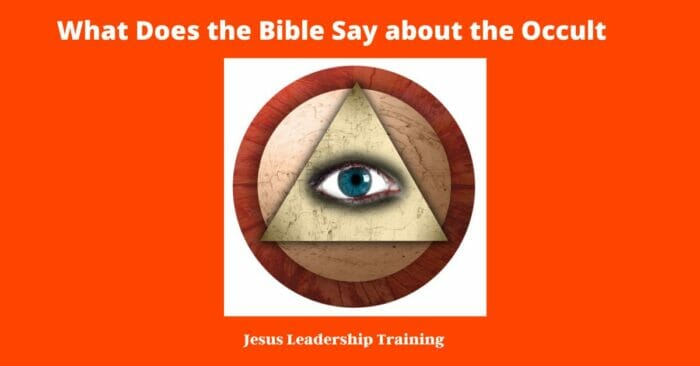What Does the Bible Say about the Occult – The Bible has a lot to say about the occult, with several verses condemning its practice and warning against its spiritual dangers. In the Old Testament, God warns the Israelites not to practice divination, sorcery, or any form of communication with the dead, as it is an abomination to Him (Deuteronomy 18:10-12).
The New Testament further emphasizes the dangers of engaging with the occult, as it describes those who practice it as being “controlled by evil spirits” and that it “leads to spiritual destruction” (Galatians 5:19-21). The Bible also cautions against any form of spiritualism or divination, as it is a false source of knowledge that leads to false beliefs and unholy practices (Acts 16:16-18). Ultimately, the Bible teaches us to be wary of the occult and to turn away from its practices.
Table of Contents
What Does the Bible Say about the Occult
The Bible has much to say about the occult, also known as the supernatural or unseen realm. This realm includes activities such as spiritualism, witchraft, astrology, divination, and other forms of fortune telling. While many people believe that the occult is harmless, the Bible makes it clear that it is a dangerous practice that can lead to spiritual harm and even demonic possession. In this blog, we will discuss what scripture says about the occult, what the Bible warns us about it, and how to avoid it.
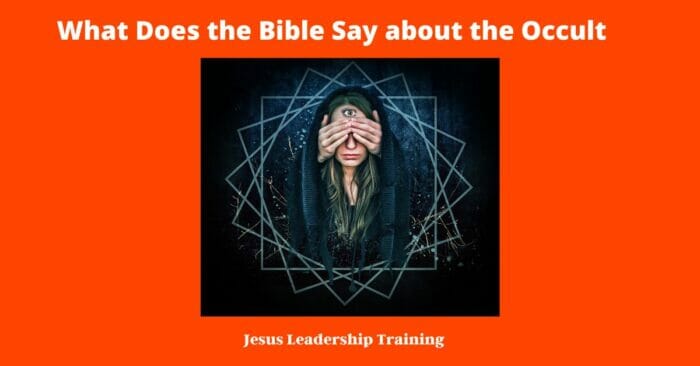
What Scripture Says about the Occult
The Bible has a lot to say about the occult and its dangers. In Deuteronomy 18:10-12, God forbids any involvement in the occult: “Let no one be found among you who sacrifices their son or daughter in the fire, who practices divination or sorcery, interprets omens, engages in witchcraft, or casts spells, or who is a medium or spiritist or who consults the dead. Anyone who does these things is detestable to the Lord; because of these same detestable practices the Lord your God will drive out those nations before you.”
The Bible also warns us to stay away from mediums and spiritists. In Leviticus 19:31, God warns us to “not turn to mediums or seek out spiritists, for you will be defiled by them.”
Etymology of the Biblical Name of Occult
The term ‘occult’ is often associated with the supernatural, mysticism, and even evil. It is a word that is often used to describe a system of beliefs and practices that are outside of traditional religious doctrines. While the origin of the word ‘occult’ is often debated, its current usage is rooted in the Bible. In this article, we will explore the etymology of the biblical name of occult and its implications for religious beliefs today.
Definition of the Word ‘Occult’
The English word ‘occult’ has its origins in the Latin verb occultare, which means ‘to hide’ or ‘to conceal’. The Latin verb is derived from the verb occulere, which means ‘to cover’ or ‘to shut away’. The English word ‘occult’ is used to refer to a body of knowledge or practices that are hidden or secret. It is often associated with esoteric or mystical practices, such as astrology or alchemy, or with supernatural forces or entities, such as ghosts or demons.
Biblical Origins of the Word ‘Occult’
The word ‘occult’ appears in the Bible several times. It is used in the context of describing a form of idolatry, which is the worship of anything other than the one true God. For example, in Leviticus 19:31, God instructs the Israelites “Do not turn to mediums or necromancers; do not seek them out, and so make yourselves unclean by them: I am the Lord your God.” The Hebrew words used in this verse are ov and qasam, which are both derived from the root word qasem, which means ‘hidden’ or ‘concealed’. This is the same root word from which the Latin verb occultare is derived.
The Hebrew words used in Leviticus 19:31 are translated as ‘mediums’ and ‘necromancers’ in English. Mediums and necromancers are practitioners of the occult arts, which involve summoning and communicating with spirits or the dead. The use of these practices was strictly forbidden in the Bible, and they are still considered to be occult by many modern religious groups.
Implications of the Biblical Name of Occult
The biblical name of occult has implications for religious beliefs and practices today. There is a wide range of beliefs and practices that are associated with the occult, and many of them are seen as being contrary to traditional religious teachings. This can create conflicts between individuals who adhere to different religious beliefs.
For example, some Christians may view astrology as occult, while others may view it as a valid form of divination. Similarly, some Christians may view the practice of magic or witchcraft as occult, while others may view it as a legitimate form of spiritual development. The term ‘occult’ is often used to describe practices that are seen as being contrary to traditional religious teachings.
Thoughts
The etymology of the biblical name of occult is rooted in the Latin verb occultare, which means ‘to hide’ or ‘to conceal’. In the Bible, the term is used to describe a form of idolatry, which is the worship of anything other than the one true God. Today, the term ‘occult’ is used to describe a wide range of beliefs and practices that are seen as being contrary to traditional religious teachings. The implications of the biblical name of occult can be seen in the conflicts that arise between individuals who adhere to different religious beliefs.
What the Bible Warns about the Occult
The Bible warns us that involvement in the occult is a dangerous practice that can open us up to spiritual harm and even demonic possession. In Deuteronomy 18:9-12, God warns us that those who practice the occult are “detestable to the Lord.” Additionally, in 1 Corinthians 10:20-21, Paul warns us that those who practice the occult are “joining themselves to demons” and will be judged for it.
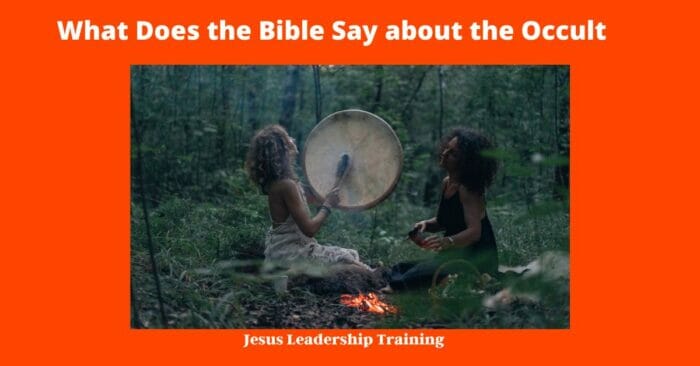
Bible Verses That Reference The Occult
John Piper’s View on the Occult
John Piper, an American pastor and theologian, also has a strong stance on the occult. He believes that the occult is a form of false worship. He says, “The occult and the supernatural are not to be trusted or sought out because they are a form of false worship and idolatry. They may appear to be harmless fun, but they are a gateway to the demonic and the dark powers of the spiritual realm.”
Who People Should Avoid in the Occult
The Bible warns us to stay away from those who practice the occult. In 1 Corinthians 10:20-22, Paul says, “No, I imply that what pagans sacrifice they offer to demons and not to God. I do not want you to be participants with demons. You cannot drink the cup of the Lord and the cup of demons. You cannot partake of the table of the Lord and the table of demons.”
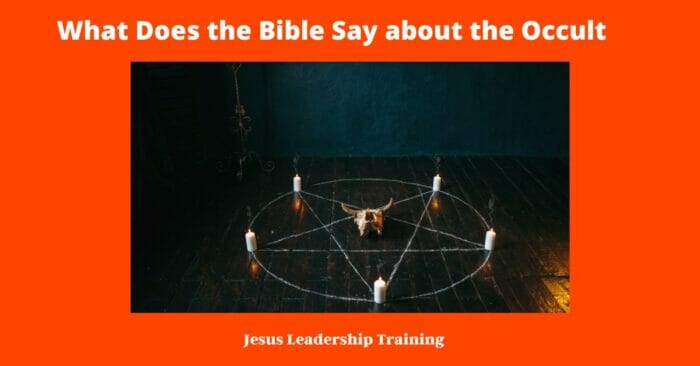
Steps we Can take to Avoid the Influence of The Occult with Description
- Pray: Praying is an effective way to break free from the influence of the occult. Pray for protection from evil spirits and for God’s guidance and help.
- Avoid Occult Practices: Steer clear of activities such as tarot card readings, Ouija boards, seances, and other occult practices.
- Educate Yourself: Learn more about the dangers of the occult and how to protect yourself from them.
- Read Scripture: Spend time reading the Bible and other spiritual texts, such as the Qur’an or the Bhagavad Gita. This will keep you grounded in faith and help you resist temptation.
- Spend Time with Friends and Family: Spend time with friends and family who share your faith and beliefs. This will help you stay focused on positive activities instead of getting involved in occult practices.
- Seek Professional Help: If you are struggling with the occult, seek professional help from a counselor or therapist who is knowledgeable about the occult and can provide guidance and support.
- Guard Your Thoughts: Monitor your thoughts and be careful to avoid entertaining negative or evil thoughts.
- Practice Mindfulness: Practice mindfulness and be in the present moment. This will help you stay focused on your current activities and will make it easier to resist temptation.
- Limit Exposure: Avoid movies, books, and other media that promote the occult, such as horror movies or fantasy books.
- Stay Busy: Fill your schedule with positive activities such as attending church, reading spiritual books, or engaging in hobbies. This will help keep your mind off of occult influences.
The Power of the Occult
The Bible also warns us about the power of the occult. In 1 Samuel 15:23, we are warned that rebellion against God is as wicked as the sin of divination and the power of the occult. Additionally, in Isaiah 8:19-20, we are warned to stay away from those who practice the occult, as they are “speaking out of the earth, from the lower parts of the earth.”
List of 20 Sinful Behaviors Referencing the Evil Power of the Occult
- Human sacrifice
- Blood rituals
- Black magic and curses
- Divination and necromancy
- Demonic possession
- Witchcraft and spellcasting
- Contacting and summoning spirits
- Astral projection and astral travel
- Participation in Satanic worship
- Astral sex and sexual rituals
- Use of Ouija Boards
- Seance and spirit channeling
- Casting hexes, curses and spells
- Tarot card readings
- Chanting and invocation of dark forces
- Possession and use of occult artifacts
- Animal and human sacrifices
- Use of dark symbols and talismans
- Use of psychoactive drugs, potions and elixirs
- Participation in satanic rituals and ceremonies
Different Forms of the Occult
The occult is a broad term that encompasses a variety of different practices. These include activities such as spiritualism, witchcraft, astrology, divination, fortune telling, and other forms of supernatural communication.
Satanic Forces and the Occult
The Bible also warns us about the power of Satan and the occult. In 2 Corinthians 4:4, we are warned that Satan is the “god of this world” and that he has blinded the minds of unbelievers so that they cannot see the light of the gospel of Christ. Additionally, in Ephesians 6:12, we are warned that our struggle is not against flesh and blood, but against the spiritual forces of evil in the heavenly realms.
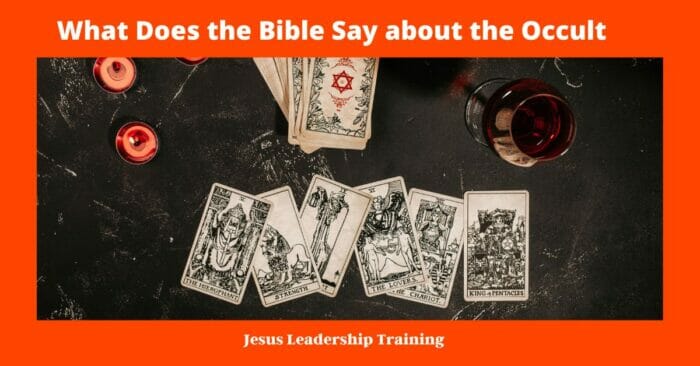
Demons and Possession in the Occult
The Bible also warns us about the power of demons and their ability to possess and influence people. In Luke 8:27-35, we read about a man who was possessed by a legion of demons, and in Matthew 12:43-45 we read about a man who was possessed by an unclean spirit. In both cases, Jesus commands the demonic spirits to leave and they are forced to obey.
Dealing with Witches in the Occult
The Bible also warns us to stay away from those who practice witchcraft. In Exodus 22:18, God commands us to not “allow a witch to live” and in Galatians 5:19-21, Paul warns us that those who practice witchcraft are among those who will not inherit the kingdom of God.
How to Recognize False Teachers in the Occult
The Bible also warns us to be on the lookout for false teachers who lead people astray. In 1 Timothy 4:1-3, Paul warns us to “watch out for those who teach false doctrine, for they are like wolves in sheep’s clothing.” Additionally, in 1 John 4:1-3, we are warned to “test the spirits to see if they are from God” and to “not believe every spirit, but test the spirits to see whether they are from God.”
- Avoid teachers who are overly focused on money or fame: False teachers in the occult may focus on making money off of their teachings and may have a following that is more focused on their status than the teachings themselves.
- Beware of teachers who claim to have “secret knowledge”: False teachers in the occult may claim to have access to a form of knowledge that is not available to others.
- Look for teachers who are willing to answer questions and explain their teachings: A true teacher in the occult should be willing to explain their teachings and will be open to questions.
- Be wary of teachers who make exaggerated claims about their powers: False teachers in the occult may make exaggerated claims about their powers and abilities.
- Be wary of teachers who are overly controlling or demanding: False teachers in the occult may be overly controlling or demanding and may not allow their students to think for themselves or question their teachings.
- Avoid teachers who are overly critical or judgmental: False teachers in the occult may be overly critical or judgmental of their students and their beliefs.
- Be careful of teachers who teach only one type of occultism: False teachers in the occult may only teach one type of occultism, such as astrology or tarot.
- Be wary of teachers who lack spiritual discernment: False teachers in the occult may lack spiritual discernment and may not be able to discern between good and bad spiritual practices.
- Avoid teachers who do not have a solid moral code: False teachers in the occult may not have a solid moral code and may be willing to engage in unethical practices.
- Look for teachers who are willing to admit their mistakes and learn from them: A true teacher in the occult should be willing to admit their mistakes and learn from them in order to improve their teachings.
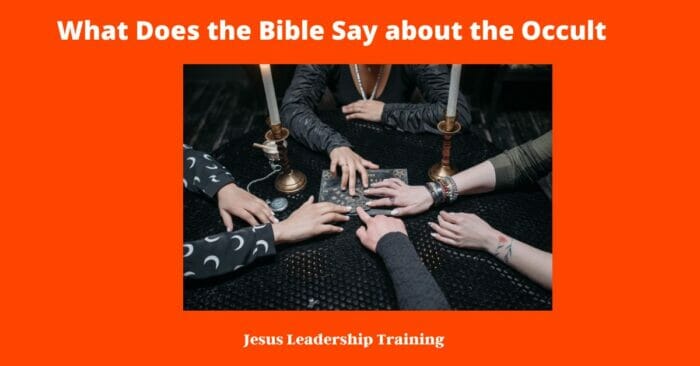
What Should a Christian Do if You Encounter Occult Practices
If you encounter someone who is involved in the occult, the Bible tells us to stay away and not to participate. In 1 Corinthians 10:14-22, Paul warns us to “flee from idolatry” and to “run from anything that stimulates youthful lusts.” Additionally, in 2 Corinthians 6:17-18, Paul commands us to “come out from them and be separate” and to “touch no unclean thing.”
Occult practices are often viewed with fear and suspicion by the Christian community. Many Christians believe that any involvement with the occult, such as tarot card readings, astrology, and séances, will lead to spiritual destruction and even demonic possession. However, it is important to note that not all occult practices are demonic or evil, and some may even be beneficial for those seeking spiritual guidance. With that in mind, what should a Christian do if they encounter occult practices?
The first thing a Christian should do when encountering an occult practice is to discern its source. We should ask ourselves whether this source is from God or from the devil. If the source of the practice is from God, then we should embrace it and use it for our own spiritual growth. Conversely, if the source of the practice is from the devil, then we should reject it and avoid it completely.
Once we have discerned the source of the practice, we should pray for God’s guidance and protection. We should ask God to show us the right path and to help us discern the truth. We should also be prepared to confront the practice with the truth of God’s word. We should boldly speak out against any beliefs or practices that contradict the Bible.
It is also important to remember that not all occult practices are evil or demonic. In fact, some practices, such as meditation and yoga, can be beneficial for personal growth and spiritual development. Therefore, it is important for us to take the time to learn about the practice and to decide for ourselves whether it is something we should embrace or reject.
Finally, we should always remember that our first and foremost responsibility is to seek God’s will and to follow His commands. We should never compromise our faith and beliefs for the sake of participating in occult practices. We should always seek to stay true to God and His word, no matter what the cost.
In conclusion, when we encounter occult practices, we should take the time to discern their source and pray for God’s guidance. We should also be prepared to confront the practice with the truth of God’s word. We should also remember that some occult practices can be beneficial for our personal growth and spiritual development. Finally, we should never compromise our faith and beliefs for the sake of participating in occult practices.
The Dangers of Getting Involved in the Occult
The Bible warns us that getting involved in the occult is a dangerous practice. In Deuteronomy 18:10-12, God warns us that those who practice the occult are “detestable to the Lord.” Additionally, in 1 Corinthians 10:21, Paul warns us that those who practice the occult are “joining themselves to demons.”
Steps to Avoid Temptation in the Occult
The Bible gives us steps to avoid the temptation of the occult. In Philippians 4:8, Paul commands us to “think on what is true, noble, right, pure, lovely, admirable, excellent and praiseworthy.” Additionally, in 1 Corinthians 10:13, Paul encourages us to “flee from idolatry” and to “run from anything that stimulates youthful lusts.”
The Bible’s Advice on Avoiding the Occult
The Bible’s advice on avoiding the occult is clear: stay away from it. In Deuteronomy 18:10-12, God commands us to “not practice divination or sorcery, interpret omens, engage in witchcraft, or cast spells.” Additionally, in 1 Corinthians 10:21, Paul warns us that those who practice the occult are “joining themselves to demons.”
Final Thoughts – What Does the Bible Say about the Occult
The Bible has a lot to say about the occult and its dangers. Scripture warns us to stay away from the occult, as it is a form of false worship and can open us up to spiritual harm and even demonic possession. We should also be aware of false teachers in the occult, as well as the power of Satan and his demonic forces. Finally, we should take steps to avoid the temptation of the occult by thinking on what is true, noble, right, pure, lovely, admirable, excellent and praiseworthy.



